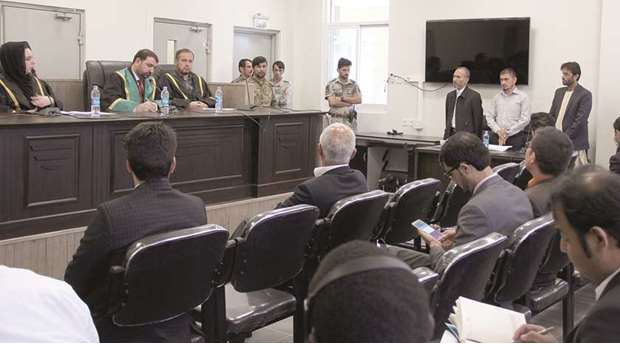Ramping up its fight against endemic corruption, Afghanistan has turned to tactics sometimes worthy of a Hollywood thriller.
One high-profile case ensnared an Interior Ministry general who had demanded a 200,000-dollar bribe from a US company bidding to supply police vehicles with fuel. The company alerted the newly formed Anti-Corruption Justice Centre (ACJC), whose detectives arrested the itchy-fingered general a few days later.
“We’ve got a colleague who looks like a businessman – nice and fat,” recalls Alif Urfani, the ACJC’s general director. Passing himself off as a representative of the bidding company, the operative agreed to the bribe and appeared at a second meeting with 200,000 dollars in 10 bundles of 20,000 dollars each.
The general, fearing he might be filmed, switched off the light for the handover, “but the colleague had a listening device on him, and when the general began counting loudly in the semi-darkness, we burst in and nabbed him red-handed with the money,” Urfani says.
The general was sentenced to 12 years in prison.
In operation since roughly the beginning of 2017, the ACJC comprises specialised police, prosecution units and courts designed to be independent of political and other pressures in detecting, investigating and prosecuting corruption.
The centre takes on the powerful, be they generals who pocket soldiers’ pay or ministers who embezzle millions.
You can see that the ACJC means business as soon as you enter its Kabul headquarters. Visitors have to pass through four security posts and hike down long passageways that are deliberately labyrinthine. Weapons are surrendered in anterooms, as they’re not allowed in judges’ chambers.
In April, two ACJC police investigators were shot dead on their way to work. Soldiers are present at every court proceeding, since the high-powered defendants sometimes snap if found guilty.
Until the ACJC was established, Afghan elites had seldom been called to account. In 2016, Afghanistan was still ranked only 169th – out of 176 countries – on Berlin-based Transparency International’s Corruption Perceptions Index. Corruption is seen as the main obstacle to reconstructing the war-torn, chronically unstable country.
Because public officials traditionally demand “shukrana” (“thanks,” ie a bribe) for services, many Afghans have to do without them and are hugely distrustful of the government.
Corruption also helps the hardline Taliban movement that is fighting Afghanistan’s national unity government. It sometimes buys weapons, fuel and food directly from Afghan army commanders.
What’s more, billions of dollars in development aid have disappeared without a trace. When Afghan President Ashraf Ghani established the ACJC by decree in July 2016, it was initially dismissed as a sop aimed at assuaging international donors.
No more.
In nearly 20 cases since December, the ADJC has convicted more than 40 senior officials, generals and businesspeople.
One of the country’s wealthiest businessmen, Abdul Ghafar Dawi, was sentenced to nine years and nine months in prison in August and ordered to pay 38 million dollars. Among the crimes committed by Dawi, head of an oil company as well as other businesses – and married to Afghanistan’s ambassador to Norway – was using falsified documents to obtain a 16-million-dollar loan from Kabul Bank that he didn’t repay.
“Finally there’s political will at the top of the government,” says Syed Muzaffar Shah, executive director of the Independent Joint Anti-Corruption Monitoring and Evaluation Committee (MEC).
Determination to stem corruption is also evidenced by a central position created by Ghani to prevent graft in awards of multimillion-dollar government contracts, and in new procedures for filling government posts, which in Afghanistan can often be bought or go to relatives.
Responding to the political pressure, the Afghan army has dismissed hundreds of officers on suspicion of corruption in recent months.
All this is just a small beginning, however, concedes Shah.
Considering the extent of nepotism, bribery and abuse of power in Afghanistan, which extends all the way down to the village level, much larger, years-long initiatives are needed to restore people’s trust in the government, he says.
The government doesn’t have much time, though. Presidential elections are scheduled for 2018, and the opposition is already coalescing.
The ACJC must continue to grow, Shah says, adding that the main priority is to quickly establish lower courts in the provinces.
Meanwhile, ACJC chief Urfani has a list of more than 120 people who will soon be formally charged with crimes.
Not all charges result in convictions. During a trial in late July, a former deputy education minister claimed to have purchased – without an invitation to tender or a contract – the equivalent of about 44,000 dollars’ worth of firewood for schools.
The prosecutor was sure that the actual amount of wood delivered had been far less in value but couldn’t prove it because the wood had been burned, and he had neither the time nor enough investigators to look into the matter more closely.
“I was in the top five of the ministry’s ethical and devout people!” the defendant shouted during the proceedings, throwing his hands up in the air. He got off with a small fine. – DPA

When Afghan President Ashraf Ghani established the ACJC by decree in July 2016, it was initially dismissed as a sop aimed at assuaging international donors. No more.
